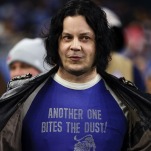Twisted

Twisted opens with Ashley Judd being sexually assaulted at knifepoint, then arresting her attacker. Lesser souls might take it easy after such a trauma, but in the next scene, Judd is back in party mode, boozing it up and bumping and grinding to James Brown's "Sex Machine," a song choice that seems to comment none too sensitively on her promiscuity. Either she's preternaturally resilient, or Twisted has a tenuous grasp on its characters' psychology. Considering that the rest of this airport paperback of a film feels inspired more by Joe Eszterhas scripts than anything else, it's safe to assume the latter is the case. A brilliant detective with a dark past whose hobbies include sobbing, drinking, rough sex with strangers, and possibly serial killing, Judd spends her days hunting down bad guys and her nights looking for Mr. Goodbar, or at least his drunk, horny, commitment-phobic buddies. Judd's disastrous personal life intersects with her professional life when her one-night stands begin turning up dead; suffering from blackouts and nightmares, Judd begins to suspect that she's the killer. Meanwhile, her police partner (Andy Garcia) makes it clear that he wouldn't mind joining the War And Peace-sized list of her sexual partners. Twisted beats into the ground the timeworn cliché of the cop who just might be a criminal, but it toys with the good/bad dialectic in another way, as well. The script insists that Judd's character is battling formidable demons, but her spunky pixie haircut says she's cute, sassy, and ready for fun. Twisted marks a bottoming-out for pretty much everyone involved, particularly Judd and director Philip Kaufman, who should know better. The film is the creative equivalent of waking up naked in a puddle of cheap wine and vomit.







![Rob Reiner's son booked for murder amid homicide investigation [Updated]](https://img.pastemagazine.com/wp-content/avuploads/2025/12/15131025/MixCollage-15-Dec-2025-01-10-PM-9121.jpg)

























![HBO teases new Euphoria, Larry David, and much more in 2026 sizzle reel [Updated]](https://img.pastemagazine.com/wp-content/avuploads/2025/12/12100344/MixCollage-12-Dec-2025-09-56-AM-9137.jpg)






